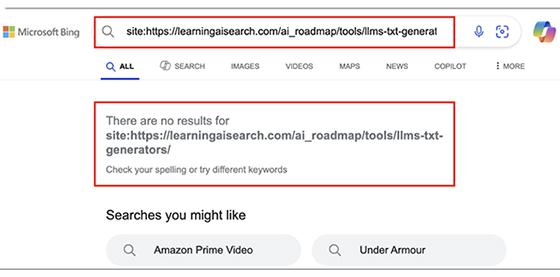
Aleyda Solís, SEO consultant and founder of the boutique
consultancy Orainti, conducted an experiment to test how rapidly ChatGPT could index a newly created web page, but discovered more than she had originally hoped.
It appears that ChatGPT
uses Google’s search results as a fallback for web pages that it cannot access or that are not yet indexed on Bing.
ChatGPT can pull from Bing's search index to provide information,
especially when it cannot browse the web.
Solis' test is interesting because it unmasks AI’s behavior rather than human behavior, analyzes the understanding of AI-based search, and looks
into where the content from across the web originates.
It also analyzes the long-term implications of search engine optimization (SEO) through the technical and practical aspects of the ways
AI models interact with content across the web.
advertisement
advertisement
It’s not entirely unusual that a search engine could source content from Google or Bing, but Solís’ findings refer to an AI
engine, not a traditional search engine.
Several search engines -- including DuckDuckGo, Yahoo, and Ecosia -- still source results from Bing, Microsoft's search engine, according to
Google AI Mode.
In the test, ChatGPT failed to find the webpage LearningAISearch.com and instead responded with the suggestion that the URL was not publicly indexed or possibly outdated. This
is not accurate, because Google Gemini found it and summarized the live page content.
Solis submitted the web page for indexing through Google Search Console, which took several hours to come
up with a direct search URL, but when submitting through Bing Webmaster Tools, Bing continued to experience problems.
ChatGPT eventually gave Solis an incomplete summary of the page’s
content. When she asked ChatGPT for the origin of that incomplete snippet, it responded that it used a cached snippet via web search, and eventually confirmed the ChatGPT response matched
Google’s search result snippet, not Bing’s.
“When I followed up asking where was that snippet they grabbed the information being shown, the answer was that it had 'located a
cached snippet via web search that previews the page content – likely from search engine indexing'," she wrote in a blog post.
Solis has since updated her post. On July 24, 2025, she explained that the
page is not "indexed by Bing but ChatGPT says it still doesn’t have access to the page content and its answer content is now based on another variation of a snippet shown in Google [search
engine results page] (now from the “site:URL” search) but not Bing."
ChatGPT continued to provide an answer based on a Google Search Results snippet -- one from a different query
related to the page.
It now uses the meta description unlike before, despite the page being now indexed by Bing, where it shows a different description snippet in those scenarios where it is
now shown in the SERPs, she wrote.
Thanks to Search Engine Journal for pointing this out.